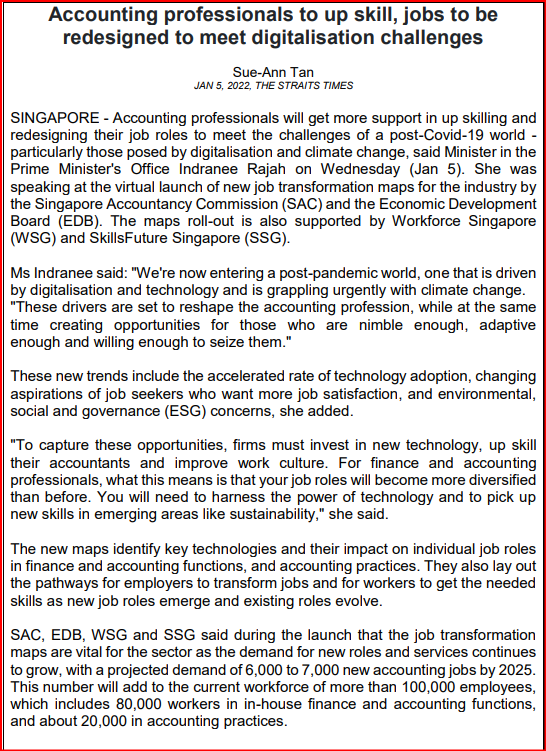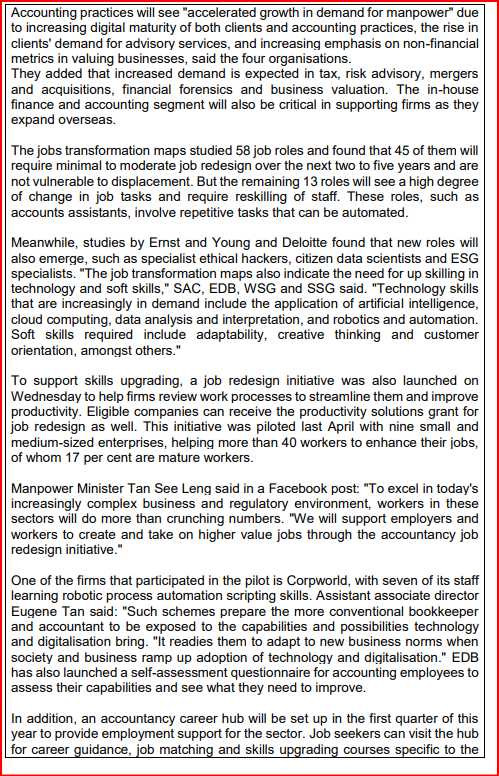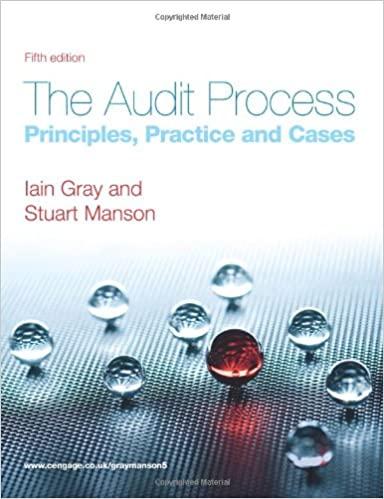Question
PART A (50 marks) Answer Question 1 based on the article above: Question 1 Identify and elaborate with examples TEN (10) technological upskill accountants may


PART A (50 marks) Answer Question 1 based on the article above: Question 1 Identify and elaborate with examples TEN (10) technological upskill accountants may need to excel in their jobs.
PART B (50 marks) Question 2 Using the FIVE (5) stages of Systems Development Life Cycle methodology explain in detail how to apply during development of an Accounting Information System at each stage. (30 marks)
Question 3 (20 marks) Technology is commonly used for security reasons. Identify and describe in detail FOUR (4) types of technologies that have been developed and utilized during the collection of cash. (20 marks
Accounting professionals to up skill, jobs to be redesigned to meet digitalisation challenges Sue-Ann Tan JAN 5, 2022, THE STRAITS TIMES SINGAPORE - Accounting professionals will get more support in up skilling and redesigning their job roles to meet the challenges of a post-Covid-19 world - particularly those posed by digitalisation and climate change, said Minister in the Prime Minister's Office Indranee Rajah on Wednesday (Jan 5). She was speaking at the virtual launch of new job transformation maps for the industry by the Singapore Accountancy Commission (SAC) and the Economic Development Board (EDB). The maps roll-out is also supported by Workforce Singapore (WSG) and SkillsFuture Singapore (SSG). Ms Indranee said: "We're now entering a post-pandemic world, one that is driven by digitalisation and technology and is grappling urgently with climate change. "These drivers are set to reshape the accounting profession, while at the same time creating opportunities for those who are nimble enough, adaptive enough and willing enough to seize them." These new trends include the accelerated rate of technology adoption, changing aspirations of job seekers who want more job satisfaction, and environmental, social and governance (ESG) concerns, she added. "To capture these opportunities, firms must invest in new technology, up skill their accountants and improve work culture. For finance and accounting professionals, what this means is that your job roles will become more diversified than before. You will need to harness the power of technology and to pick up new skills in emerging areas like sustainability," she said. The new maps identify key technologies and their impact on individual job roles in finance and accounting functions, and accounting practices. They also lay out the pathways for employers to transform jobs and for workers to get the needed skills as new job roles emerge and existing roles evolve. SAC, EDB, WSG and SSG said during the launch that the job transformation maps are vital for the sector as the demand for new roles and services continues to grow, with a projected demand of 6,000 to 7,000 new accounting jobs by 2025. This number will add to the current workforce of more than 100,000 employees, which includes 80,000 workers in in-house finance and accounting functions, and about 20,000 in accounting practices. Accounting practices will see "accelerated growth in demand for manpower" due to increasing digital maturity of both clients and accounting practices, the rise in clients' demand for advisory services, and increasing emphasis on non-financial metrics in valuing businesses, said the four organisations. They added that increased demand is expected in tax, risk advisory, mergers and acquisitions, financial forensics and business valuation. The in-house finance and accounting segment will also be critical in supporting firms as they expand overseas. The jobs transformation maps studied 58 job roles and found that 45 of them will require minimal to moderate job redesign over the next two to five years and are not vulnerable to displacement. But the remaining 13 roles will see a high degree of change in job tasks and require reskilling of staff. These roles, such as accounts assistants, involve repetitive tasks that can be automated. Meanwhile, studies by Ernst and Young and Deloitte found that new roles will also emerge, such as specialist ethical hackers, citizen data scientists and ESG specialists. "The job transformation maps also indicate the need for up skilling in technology and soft skills," SAC, EDB, WSG and SSG said. "Technology skills that are increasingly in demand include the application of artificial intelligence, cloud computing, data analysis and interpretation, and robotics and automation. Soft skills required include adaptability, creative thinking and customer orientation, amongst others." To support skills upgrading, a job redesign initiative was also launched on Wednesday to help firms review work processes to streamline them and improve productivity. Eligible companies can receive the productivity solutions grant for job redesign as well. This initiative was piloted last April with nine small and medium-sized enterprises, helping more than 40 workers to enhance their jobs, of whom 17 per cent are mature workers. Manpower Minister Tan See Leng said in a Facebook post: "To excel in today's increasingly complex business and regulatory environment, workers in these sectors will do more than crunching numbers. "We will support employers and workers to create and take on higher value jobs through the accountancy job redesign initiative." One of the firms that participated in the pilot is Corpworld, with seven of its staff learning robotic process automation scripting skills. Assistant associate director Eugene Tan said: "Such schemes prepare the more conventional bookkeeper and accountant to be exposed to the capabilities and possibilities technology and digitalisation bring. "It readies them to adapt to new business norms when society and business ramp up adoption of technology and digitalisation." EDB has also launched a self-assessment questionnaire for accounting employees to assess their capabilities and see what they need to improve. In addition, an accountancy career hub will be set up in the first quarter of this year to provide employment support for the sector. Job seekers can visit the hub for career guidance, job matching and skills upgrading courses specific to the Accounting professionals to up skill, jobs to be redesigned to meet digitalisation challenges Sue-Ann Tan JAN 5, 2022, THE STRAITS TIMES SINGAPORE - Accounting professionals will get more support in up skilling and redesigning their job roles to meet the challenges of a post-Covid-19 world - particularly those posed by digitalisation and climate change, said Minister in the Prime Minister's Office Indranee Rajah on Wednesday (Jan 5). She was speaking at the virtual launch of new job transformation maps for the industry by the Singapore Accountancy Commission (SAC) and the Economic Development Board (EDB). The maps roll-out is also supported by Workforce Singapore (WSG) and SkillsFuture Singapore (SSG). Ms Indranee said: "We're now entering a post-pandemic world, one that is driven by digitalisation and technology and is grappling urgently with climate change. "These drivers are set to reshape the accounting profession, while at the same time creating opportunities for those who are nimble enough, adaptive enough and willing enough to seize them." These new trends include the accelerated rate of technology adoption, changing aspirations of job seekers who want more job satisfaction, and environmental, social and governance (ESG) concerns, she added. "To capture these opportunities, firms must invest in new technology, up skill their accountants and improve work culture. For finance and accounting professionals, what this means is that your job roles will become more diversified than before. You will need to harness the power of technology and to pick up new skills in emerging areas like sustainability," she said. The new maps identify key technologies and their impact on individual job roles in finance and accounting functions, and accounting practices. They also lay out the pathways for employers to transform jobs and for workers to get the needed skills as new job roles emerge and existing roles evolve. SAC, EDB, WSG and SSG said during the launch that the job transformation maps are vital for the sector as the demand for new roles and services continues to grow, with a projected demand of 6,000 to 7,000 new accounting jobs by 2025. This number will add to the current workforce of more than 100,000 employees, which includes 80,000 workers in in-house finance and accounting functions, and about 20,000 in accounting practices. Accounting practices will see "accelerated growth in demand for manpower" due to increasing digital maturity of both clients and accounting practices, the rise in clients' demand for advisory services, and increasing emphasis on non-financial metrics in valuing businesses, said the four organisations. They added that increased demand is expected in tax, risk advisory, mergers and acquisitions, financial forensics and business valuation. The in-house finance and accounting segment will also be critical in supporting firms as they expand overseas. The jobs transformation maps studied 58 job roles and found that 45 of them will require minimal to moderate job redesign over the next two to five years and are not vulnerable to displacement. But the remaining 13 roles will see a high degree of change in job tasks and require reskilling of staff. These roles, such as accounts assistants, involve repetitive tasks that can be automated. Meanwhile, studies by Ernst and Young and Deloitte found that new roles will also emerge, such as specialist ethical hackers, citizen data scientists and ESG specialists. "The job transformation maps also indicate the need for up skilling in technology and soft skills," SAC, EDB, WSG and SSG said. "Technology skills that are increasingly in demand include the application of artificial intelligence, cloud computing, data analysis and interpretation, and robotics and automation. Soft skills required include adaptability, creative thinking and customer orientation, amongst others." To support skills upgrading, a job redesign initiative was also launched on Wednesday to help firms review work processes to streamline them and improve productivity. Eligible companies can receive the productivity solutions grant for job redesign as well. This initiative was piloted last April with nine small and medium-sized enterprises, helping more than 40 workers to enhance their jobs, of whom 17 per cent are mature workers. Manpower Minister Tan See Leng said in a Facebook post: "To excel in today's increasingly complex business and regulatory environment, workers in these sectors will do more than crunching numbers. "We will support employers and workers to create and take on higher value jobs through the accountancy job redesign initiative." One of the firms that participated in the pilot is Corpworld, with seven of its staff learning robotic process automation scripting skills. Assistant associate director Eugene Tan said: "Such schemes prepare the more conventional bookkeeper and accountant to be exposed to the capabilities and possibilities technology and digitalisation bring. "It readies them to adapt to new business norms when society and business ramp up adoption of technology and digitalisation." EDB has also launched a self-assessment questionnaire for accounting employees to assess their capabilities and see what they need to improve. In addition, an accountancy career hub will be set up in the first quarter of this year to provide employment support for the sector. Job seekers can visit the hub for career guidance, job matching and skills upgrading courses specific to theStep by Step Solution
There are 3 Steps involved in it
Step: 1

Get Instant Access to Expert-Tailored Solutions
See step-by-step solutions with expert insights and AI powered tools for academic success
Step: 2

Step: 3

Ace Your Homework with AI
Get the answers you need in no time with our AI-driven, step-by-step assistance
Get Started


